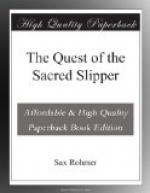He ceased uneasily, and glanced at the tall Eastern figure. It had edged a little nearer; the head was still bowed and the fine yellow waxen fingers of the hand from which he had removed his glove fumbled with the catalogue’s leaves. It may well have been that in those days I read menace in every eye, yet I felt assured that the yellow visitor was eavesdropping—was malignantly attentive to the conversation.
The curator spoke lower than ever now; no one beyond the circle could possibly hear him as he proceeded—
“We discovered an Alexandrian Greek who, for personal reasons, not unconnected with matrimony, had turned Moslem! He carried the slipper here, strongly escorted, and placed it where you now see it. No other hand has touched it.” (The speaker’s voice was raised ever so slightly.) “You will note that there is a rail around the case, to prevent visitors from touching even the glass.”
“Ah,” said Dr. Nicholson quizzically, “And has anything untoward happened to our Graeco-Moslem friend?”
“Perhaps Inspector Bristol can tell,” replied the curator.
The straight, military figure of the well-known Scotland Yard man was conspicuous among the group of distinguished—and mostly round-shouldered—scholars.
“Sorry, gentlemen,” he said, smiling, “but Mr. Acepulos has vanished from his tobacco shop in Soho. I am not apprehensive that he had been kidnapped or anything of that kind. I think rather that the date of his disappearance tallies with that on which he cashed his cheque for service rendered! His present wife is getting most unbeautifully fat, too.”
“What precautions,” someone asked, “are being taken to guard the slipper?”
“Well,” Mostyn answered, “though we have only the bare word of the late Professor Deeping that the slipper was actually worn by Mohammed, it has certainly an enormous value according to Moslem ideas. There can be no doubt that a group of fanatics known as Hashishin are in London engaged in an extraordinary endeavour to recover it.”
Mostyn’s voice sank to an impressive whisper. My gaze sought again the tall Eastern visitor and was held fascinated by the baffled straining in those velvet eyes. But the lids fell as I looked; and the effect was that of a fire suddenly extinguished. I determined to draw Bristol’s attention to the man.
“Accordingly,” Mostyn continued, “we have placed it in this room, from which I fancy it would puzzle the most accomplished thief to remove it.”
The party, myself included, stared about the place, as he went on to explain—
“We have four large windows here; as you see. The Burton Room occupies the end of a wing; there is only one door; it communicates with the next room, which in turn opens into the main building by another door on the landing. We are on the first floor; these two east windows afford a view of the lawn before the main entrance; those two west ones face Orpington Square; all are heavily barred as you see. During the day there is a man always on duty in these two rooms. At night that communicating door is locked. Short of erecting a ladder in full view either of the Square or of Great Orchard Street, filing through four iron bars and breaking the window and the case, I fail to see how anybody can get at the slipper here.”




